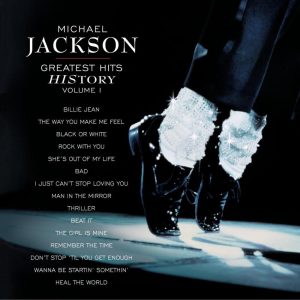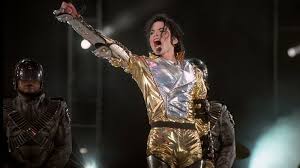Jonathan Bruce
READING TIME: 11 MINUTES
1995 was quite a year of popular music. The record industry was still reeling from the suicide of Nirvana frontman Kurt Cobain the previous year. Grunge music had lost some of its allure and fallen off the popular landscape. Rap, hip-hop and R&B music were becoming part of the mainstream culture. Groups like Boyz II Men and Backstreet were taking the airwaves and audiences by storm. TLC was riding the success of their album and hit single “Waterfalls”. New Jack Swing had long since declined and was considered old-fashioned and outdated. Boybands such as Backstreet Boys and N’Sync were still relatively new and looking for success, but neither had struck gold in America yet.
And in the midst of all that was Michael Jackson’s HIStory.

HIStory album cover (Sony and Epic Records)
Jackson had been coming off a turbulent three-year period. His previous album Dangerous proved to be a critical and commercial hit and the highest New Jack Swing-centric album, but it was seen as a step down from his 1980s output, Thriller and Bad. The singer had also faced allegations of child sexual abuse in 1993, which were settled out of court by 1994. Although the case never made it to trial, Jackson’s image and popularity were both deeply affected in America. His brief marriage to Lisa Marie Presley also made him the focus of tabloids and media scrutiny. In addition, he was on the receiving end of speculation and rumour regarding his ever-changing physical appearance and an addiction to plastic surgery.
HIStory: Past, Present, and Future, Book I is essentially a double-album consisting of a greatest hits record and a disc (titled HIStory Continues) of new material. Several fans grumbled about the prospect of having to shell out more money to buy the older hits in order to purchase the new album. In addition, the cost was quite higher than usual, due to an elaborate marketing campaign. One such stunt was having thirty-feet statues of Jackson in military attire set up in various European cities. Due to these expensive costs, Sony and Columbia counted the two halves as being separate albums. As a result, while both discs were sold together, each has separate certifications with the Recording Industry Association of America. However, it remains one of the highest-earning double albums with more than 20 million copies sold.
The first disc is basically a hits compilation. It is the realization of a planned but unmade greatest album titled Decade, which would have covered Jackson’s solo career from 1978 to 1988, that Sony intended to release at the end of the 1980s. All the recognizable Jackson songs are there, and the Thriller and Bad albums are well-represented. “Billie Jean”, “The Way You Make Me Feel”, “I Just Can’t Stop Loving You”, “Beat It”, “Man in the Mirror”, and “Bad” are all featured. Jackson also gives focus to his Off the Wall album by featuring “Rock with You”, “She’s Out of My Life”, and “Don’t Stop ’Til You Get Enough”. Having been released four years prior, the Dangerous album is represented by “Black or White”, “Remember the Time”, and “Heal the World”. Strangely, the hit songs “Human Nature” and “Smooth Criminal” are absent for some reason, presumably for length constrictions on the disc.
In terms of lyrical content and quality, HIStory is an angry, edgy, and politically charged album. The songs vary in genre from pop-rock (“They Don’t Really Care About Us”) to hip-hop (“2 Bad”) to rap-rock (“DS”) to R&B (“You Are Not Alone”) to ballads (“Childhood”, “Earth Song”). It stands as the singer’s most raw artistic work, since he takes aim at critics, the justice system, corrupt politicians, and the media. Given the legal troubles Jackson faced in previous years, the content of the lyrics is quite heated and bitter at various points.

Sony and Epic Records
HIStory kicks off with the lead single “Scream”, a dance-pop duet performed by Jackson and his sister Janet. It consists of critiquing the media, the tabloids, and the false claims that dominate society: “Tired of telling the story your way/You’re causing confusion/You think it’s okay/You keep changing the rules/While you keep playing the game.”. The track is notable for being the first and only time in their careers that the siblings collaborated together on a song. At one point, both scream out the words “Stop f***ing with me” as a way of lashing out against the critics, and it’s the only instance of Jackson using that word in a song.
Next up is “They Don’t Care About Us”, a pop-rock, dancehall track with samba-reggae influences. It serves as a protest song about racial discrimination, police corruption, human rights abuses, and police brutality. Jackson’s narrative focuses on a man struggling with being harassed due to his ethnicity while questioning the state of America. His lyrics are quite hard-hitting and raw: “Skinhead, dead head/Everybody gone bad/Situation, aggravation/Everybody allegation/In the suit, on the news/Everybody dog food/Bang bang, shot dead/Everybody’s gone mad.”. The track is written in D minor with a 90 beat per minute tempo. During the middle eight, the song veers into rock territory with an extended lead guitar solo that would not be out of place on a Van Halen album.
Ultimately, this song got Jackson in trouble over the lyrics “J** me, sue me/Everybody do me/Kick me, k*** me/Don’t you black or white me.”. Media outlets and critics accused the singer of promoting anti-Semitism in his song. As a response, Jackson issued two public apologies and claimed that his message had been misinterpreted by the media. He stated: “The idea that these lyrics could be deemed objectionable is extremely hurtful to me, and misleading. The song, in fact, is about the pain of prejudice and hate and is a way to draw attention to social and political problems. I am the voice of the accused and the attacked. I am the voice of everyone. I am the skinhead, I am the Jew, I am the black man, I am the white man. I am not the one who was attacking. It is about the injustices to young people and how the system can wrongfully accuse them.”. Despite the explanation, critics felt the choice of lyrics were misguided and not appropriate for younger listeners, whom they felt would not understand the words’ place in the context of the song. Jackson made a point to obscure the offensive terms by adding loud noises on later printings of the album, yet if one listens closely, the words can still be audibly heard. A further message from the singer read: “There has been a lot of controversy about my song, “They Don’t Care About Us”. My intention was for this song to say “No” to racism, anti-Semitism and stereotyping. Unfortunately, my choice of words may have unintentionally hurt the very people I wanted to stand in solidarity with.”
“Stranger in Moscow” is one of the strongest tracks on the album. As an R&B ballad, it focuses on topical themes of alienation and loneliness while underscored by keyboards and synthesizer. It ends with a message spoken in Russian, which translates to “Why have you come into the west? Confess! To steal the great achievements of the people, the accomplishments of the workers.”. Curiously, the song refers to the KGB organization and Joseph Stalin’s tomb, both of which were no longer in existence at the time of this album’s creation. Evidently, Jackson did not brush up on his reading of European history, so perhaps the viewer can chalk this one up to a mere historical anachronism. Oddly enough, “Stranger in Moscow”’s origins are rooted in being a composition for the Sonic the Hedgehog 3 video game, but Jackson later bowed out of said project due to issues with Sega and repurposed the song for this album.
“This Time Around” marks Jackson’s second collaboration on the album, and it is with rap artist Christopher “the Notorious B.I.G” Wallace. The track is a New Jack Swing track with a tempo of 106 beats per minute. Jackson and Biggie examine what it means to be a celebrity and coping with fame, culminating in the two commiserating about their problems and dealing with false accusations. While the song did fairly well on the US Dance Club Songs, R&B/Hip-Hop and Rhythmic Charts, “This Time Around” was never actually released as a commercial single, which ruled it ineligible from being included on the Billboard Hot 100.
“Earth Song” is a pop ballad concerned with themes of environmentalism and animal rights. It explores the relationship humanity has with the planet Earth, as well as the wanton destruction and disregard for our ecosystems. Jackson sings about how people have committed wrongdoings such as animal cruelty, destroying nature, and waging wars. The song also contains influences of blues, opera, and gospel music. Ultimately, “Earth Song” proved to be a huge hit internationally in Europe, but it was largely ignored in America.
“D.S.” is probably the most heated, vitriolic track on the entire album. It is a hard rock/rap-rock song that focuses on corruption within law enforcement, as well as paranoia and racism. Combining rapped verses with instrumentation by Guns N’ Roses guitarist Slash, Jackson pours his loathing for then-Santa Barbara County District Attorney Tom Sneddon, who prosecuted him over child abuse allegations in 1993 and later in 2005. Such lyrics include “He wanna get my ass, dead or alive/You know he tried to take me down by surprise/He do missions for the CIA/He do whatever they say” and “Dom Sheldon is a cold man.”. To avoid the risk of being sued for libel and defamation, the politician is renamed “Dom Sheldon” in the song for obvious reasons, but when listening closely, Jackson clearly sings “Thomas Sneddon is a cold man.” Perhaps most chilling is the song concluding with a gun being fired; whether it symbolizes corrupt figures committing crimes or suggesting what must be done to the corrupt individual remains unknown. For his part, Sneddon (who passed away in 2014) only commented on the track once in his lifetime; “I have not- shall we say- done him the honor of listening to it, but I’ve been told that it ends with the sound of a gunshot.”
“Money” focuses on how desires for wealth can lead people to do horrible things. Jackson makes this clear within the lyrics: “If you show me the cash/Then I will take it/If you tell me to cry/Then I will fake it/If you give me a hand/Then I will shake it/You do anything for money.”. This song also got Jackson in legal trouble with Evan Chandler, the father whose child was at the centre of the 1993 accusations against Jackson. Chandler attempted to sue the singer for defamation and violating a confidentiality agreement that was signed as part of the settlement terms, but it was thrown out of court. Perhaps even more bizarrely, Chandler wanted to make his own album (reportedly titled EVANstory), yet nothing came of this plan.
The second half of the new material varies from solid, hard hitting tracks to rhythm and blues towards emotionally sappy territory. “Come Together” is an interesting pop-rock cover version of the Beatles’ classic song. It had been recorded years earlier for the Moonwalker video project, so this is one of the oldest tracks among the album’s “new” songs. Ten years earlier, Jackson had outbid Paul McCartney by paying $47.5 million for ATV Publishing, which included 250 Beatles compositions. One might argue the cover’s inclusion here is meant to address issues covered by the previous songs on the album, but that’s a debate for another time.
“You Are Not Alone” is an R&B ballad written by disgraced artist R. Kelly, which proved to be Jackson’s final number-one hit in America during his lifetime. The song is one of Jackson’s slowest tracks, because it is a B major composition with the tempo at 60 beats per minute. Ironically, this song also became the subject of legal action in Belgium, where two songwriters sued Kelly for plagiarizing their own composition. While Jackson had nothing to do with the case, the song was pulled from Belgian radio outlets, and the victorious plaintiffs in that suit continue to receive songwriting royalties from this album.
“Childhood” ventures into nostalgic, bittersweet territory with an orchestral pop sound and children’s chorus. The singer reflects on his past and acknowledges the image of him being an eccentric man-child. “Before you judge me/Try hard to love me” he sings, but in light of the ongoing allegations against Jackson, these lyrics have not really aged well in recent years. While fans were already bored to tears with Jackson singing about his lost youth, the song feels like an overproduced number, and it doesn’t really jive with the rest of the album.
“Tabloid Junkie” is a funk rock number that serves as a “take that” critique on the news industry as a whole. The track addresses the issues of sensationalism and bias by journalists. After an opening of various media sound bites, Jackson addresses his audience by saying, “Just because you read it in the magazine or see it on the TV screen don’t make it factual”, and calls out journalists as “torture men” who “speculate to break the one you hate.”. Much like “They Don’t Care About Us” and “D.S.”, the song is an angry, heated attack on the media and those who become addicted to it.
“2 Bad” is a hip-hop-based composition that contains Run-D.M.C music samples and also includes beatboxing. Out of all the tracks on the album, this song feels unique, fresh and invigorating as a Jackson track. In a surprise cameo, famed basketball player Shaquille “Shaq” O’Neal pops up near the end to deliver a guest rap verse. One could suggest the song acts as a spiritual sequel of sorts to the 1987 song “Bad.”
“History” examines how the past has shaped our present and will help to define the future. The song serves as a musique concrete of sorts by interpolating samples of famous historical speeches and soundbites over hip-hop beats. During the chorus, the singer states: “Every day create your history/Every path you take you’re leaving your legacy/Every soldier dies in his glory/Every legend tells of conquest and liberty.” Samples of Martin Luther King Jr., Malcolm X, Lowell Thomas, Senator Ted Kennedy, baseball legend Lou Gehrig, Neil Armstrong, Muhammad Ali, and Thomas Edison can be heard throughout the track. As a result, “History” feels more of an extended sound montage than a song itself.
“Little Susie” is a grim, somber track about the tragic death of a young girl. It opens with a choral rendition of “Pie Jesu” before transitioning to a child humming along to the melody of a toy piano. Jackson notes, “Father left home, poor mother died/Leaving Susie alone/Grandfather’s soul too had flown/No one to care/Just to love her/How much can one bear/Rejecting the needs in her prayers.”. Reportedly, the basis of the song was inspired by a true story, which makes it all the more dark and unsettling.
The album concludes with “Smile”- a cover version of the classic song by Charlie Chaplin. It’s a nice, thoughtful way to provide a softer track on an edgy, politically-fuelled record, but this also highlights an issue itself. While Jackson was a huge fan of the actor-turned-filmmaker, the track doesn’t line up with the rest of the album tracks, nor does it fit with the overall themes.

Sony and Epic Records
So why is HIStory not regarded highly by the music fans and critics of today?
Presumably, it was due to a number of factors. First, the legal allegations surrounding Jackson and rumours of his private life were too prominent to ignore. A lot of people began to regard the singer as an eccentric recluse in the vein of Howard Hughes. Secondly, many individuals in the music industry and executives at Sony felt that Jackson (then only 37) was past his prime and slowly on the decline in his career. Having been in the music business for nearly thirty years, the “King of Pop” was being overshadowed by younger, more relatable commercial artists of the 1990s. Yet the periods of production between album releases were getting increasingly longer. He would only go on to record more more album (Invincible) during his lifetime before passing away in 2009. Another fact was the nature of various songs on HIStory, which have a number of New Jack Swing elements. These were seen as outdated and no longer relevant by 1995 standards.
But perhaps one of the biggest issues was the inclusion and length of certain songs. While most songs run between three to four minutes, all the tracks on HIStory last from four to nearly seven minutes. Furthermore, songs like “Childhood”, “Come Together”, “Little Susie” and “Smile” don’t really fit or work with the album’s main themes; indeed, the former comes off as a piece of weepy melodrama that bores listeners to death. In addition, “Earth Song” works as an environmentalist-inspired track, but its inclusion here is questionable. Theoretically, Jackson could have edited down the album and left some tracks off, which would make for a more cohesive structure. Maybe, in some circumstances, it is true that less is indeed more.
Overall, HIStory is one of the more interesting yet divisive record of the 1990s. While it was not a monumental seller like Thriller, the album proved Jackson still had something that many artists struggle to achieve: staying power. One can only imagine the effort it would take to deliver an album that serves as both a greatest hits collection and new music at the same time. Still, not many artists in today’s climate could attempt to put out such an ambitious project.



